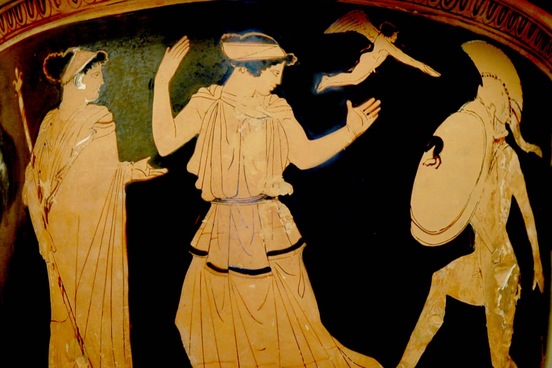
Fubsy
Definition:
: chubby and somewhat squat
Example:
"He was already cozily, as of wont, seated upon the widow's little fubsy sofa, with the lady by his side, and he had just taken her hand, and was about to renew his suit, to pour forth the impromptu effusions of his heart, concocted on the quarter-deck of the Yungfrau, when who should bolt into the parlour but the unwelcome Snarleyyow." Frederick Marryat, Snarleyyow: Or, The Dog Fiend, 1837
About the Word:
Fubsy is a dialectal English word which came into use at the end of the 18th century, and has not seen much use of late.
It is a pleasant little word, and useful to boot, since we have so many things in this world that are both squat and chubby. The earliest current evidence for its use comes in 1775, in Michael Dorset's Philosophic Venus, in which he wrote "Slighted by those who look with wishful eyes, on fubsy cheeks and crumbiness of size."

Cicisbeo
Definition:
: the recognized gallant of a married woman in Italy especially in the 18th century
Example:
"It is almost impossible for us northerners to take the cicisbeo seriously. He was a cross between a pet dog and a lady's maid, and was beneath them both." - Charles Edwardes, The Living Age, Vol. 195, 1892
About the Word:
There exists in English such a disparity between the number of words to describe women and men of loose morals that it is perhaps worth resurrecting cicisbeo, in an attempt to balance the scales of fairness just a bit.
Words to describe a woman of questionable moral fiber include strumpet, harlot, trull, quean, callet, light-skirts, minx, succubus, fricatrice, trollop, blowen, floozy (and many, many more). Although cicisbeo more properly refers to the man who is the companion or lover of a woman who is married to someone else, it might be thought of as having some overlap with 'man of loose morals.'

Fleshment
Definition:
: excitement associated with a successful beginning
Example:
"For him attempting who was self-subdu'd; and, in the fleshment of this dead exploit, drew on me here again." - William Shakespeare, King Lear, 1623
About the Word:
There would not appear to be a corresponding word in English for 'the crushing sense of defeat attending the realization that things will not work out as planned' (unless you feel that maturity fits the bill), which is rather a shame. But fleshment carries such a lovely meaning that it is worth more attention.
Definition:
: beauty or a beautiful thing
Example:
"'Why, ya-es,' observed Kit, looking hesitatingly critical, 'she is certainly an inordinate formosity - at least I think I may vaynture to say so.'" - Joseph Thomas James Hewlett, Peter Priggins, 1841
About the Word:
Some words, particularly those of the onomatopoeic variety, such as buzz, sound like the thing they describe. Others have come to resemble their definitions, much as certain cats or dogs seem to come to resemble their owners.
And then there are words such as formosity, which is delightfully dissimilar to its meaning. This is a useful word if you want to confuse the person with whom you are speaking. It is also a useful word if you find yourself among those who like to collect beautiful words simply for their own sake.

Lickpenny
Definition:
: something that uses up money
Example:
"They are deeply attached to one another; but since her mother, a widow with considerable property under her own control, is a deeply stupid, griping, illiberal, avid, tenacious, pinchfist lickpenny, a sordid lickpenny and a shrew, there is no hope of marriage without his estate is cleared and he can make at least some kind of settlement upon her." Patrick O'Brian, H.M.S. Surprise, 1973
About the Word:
It's rare to find a word that is so metaphoric and poetic all by itself, but lickpenny (defined by the Oxford English Dictionary as "something that 'makes the money go') merits this description. It first entered the English language in the 15th century, as the title of a poem that has been attributed to John Lydgate.

Makebate
Definition:
: one that excites contentions and quarrels
Example:
"So that love in her passions (like a right makebate) whispered to both sides arguments of quarrel." - Philip Sydney, The Countess of Pembroke's Arcadia, 1590
About the Word:
Admittedly, we already have the word troublemaker, which, although a bit broad, occupies much of the same semantic territory as makebate.
But if you are a follower of Winston Churchill's ostensible dictum "In general, the short words are the best, and the old words best of all," then makebate is the word for you. For it is not only two syllables shorter than troublemaker, it has been in use in English for about three hundred years longer (1529 vs. 1834).

Mundivagant
Definition:
: wandering over the world
Example:
"This was in consension with my affectuousity; for I would lever be mundivagant than hospitate with such a sept as his; and at the ignition of the vernal season, I gave his maledicted bye a sempiternal valediction.” Samuel K. Hoshour, Letters to Squire Pedant, 1870
About the Word:
Lexicographers typically live by a stringent code of ethics that includes a rule about not entering words they've made up in the dictionaries they're writing. From what we can tell, Thomas Blount did not abide by that particular rule. Mundivagant appears in print for the first time in Blount's 1656 Glossographia, a dictionary he published in 1656.

Nutation
Definition:
: the act of nodding; especially: an involuntary nodding of the head
Example:
"Or else you may see, in your sleep's perturbations,/ Some old and uncommonly ugly relations,/ Who'll be very apt to disturb your nutations/ By unpleasant allusions, and rude observations!" - John Godfrey Saxe, Richard of Gloster (from The Money-King, and Other Poems), 1860
About the Word:
For some reason most of us find it delightful to discover a word that describes a particular phenomenon very specifically, even if we will rarely have need to use the word. Now, if you have a companion prone to nutation, you'll at least have a word to label what you observe.
Nutation comes to us from the [past participle](/dictionary/past participle) of the Latin word nutare, which means 'to nod, sway, or rock.'
In addition to referring to the nodding of the head, nutation has meanings related to 'the vibratory displacement of the axis of a precessing top or gyroscope,' 'a libratory motion of the earth's axis,' and 'an autonomic movement' - in case you need to put someone to sleep by means of verbal skill alone.

Quinquennium
Definition:
: a period of five years
Example:
"After the age of 50, that is, when the working period of life is over, the death-rates in asylums rise from quinquennium to quinquennium by a considerable but irregular progress." - Journal of the Institute of Actuaries, 1890
About the Word:
It's somewhat odd that everyone knows the word for a span of ten years (decade) and certainly we all know the word for a year's time (year), yet so few of us know the word for a span of five years.
But it is not as odd as it seems; the English language is awash in interesting words for time that no one ever uses. In addition to quinquennium we have biennium (a period of two years), duodecennial (occurring once in 12 years), quadrennium (a period of four years), septennium (a period of seven years), and sexennial (continuing or lasting six years).

Whatness
Definition:
: the what of a thing
Example:
"The radiance of which he speaks in the scholastic quidditas, the whatness of a thing." - James Joyce, A Portrait of the Artist as a Young Man, 1916
About the Word:
It should be noted that whatness is not without synonyms: quiddity and haecceity are obscure words meaning much the same thing, and essence likewise carries a very similar meaning.
One of the glories of the English language is that it has room for so many linguistic twins. Sometimes you feel like saying quiddity, and sometimes you feel like saying whatness.
It is always refreshing to find an obscure word that does not require any explanation.






